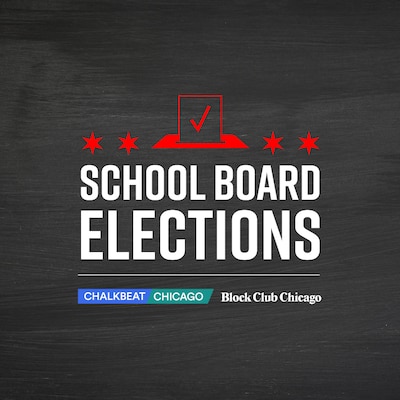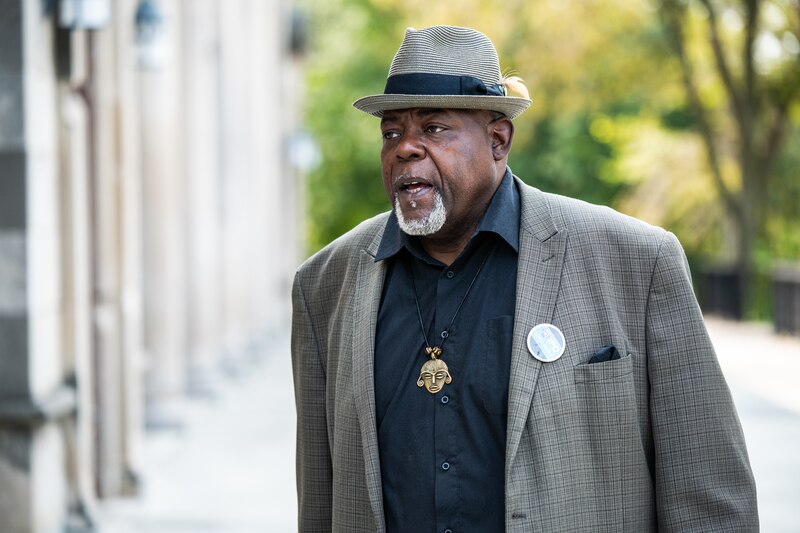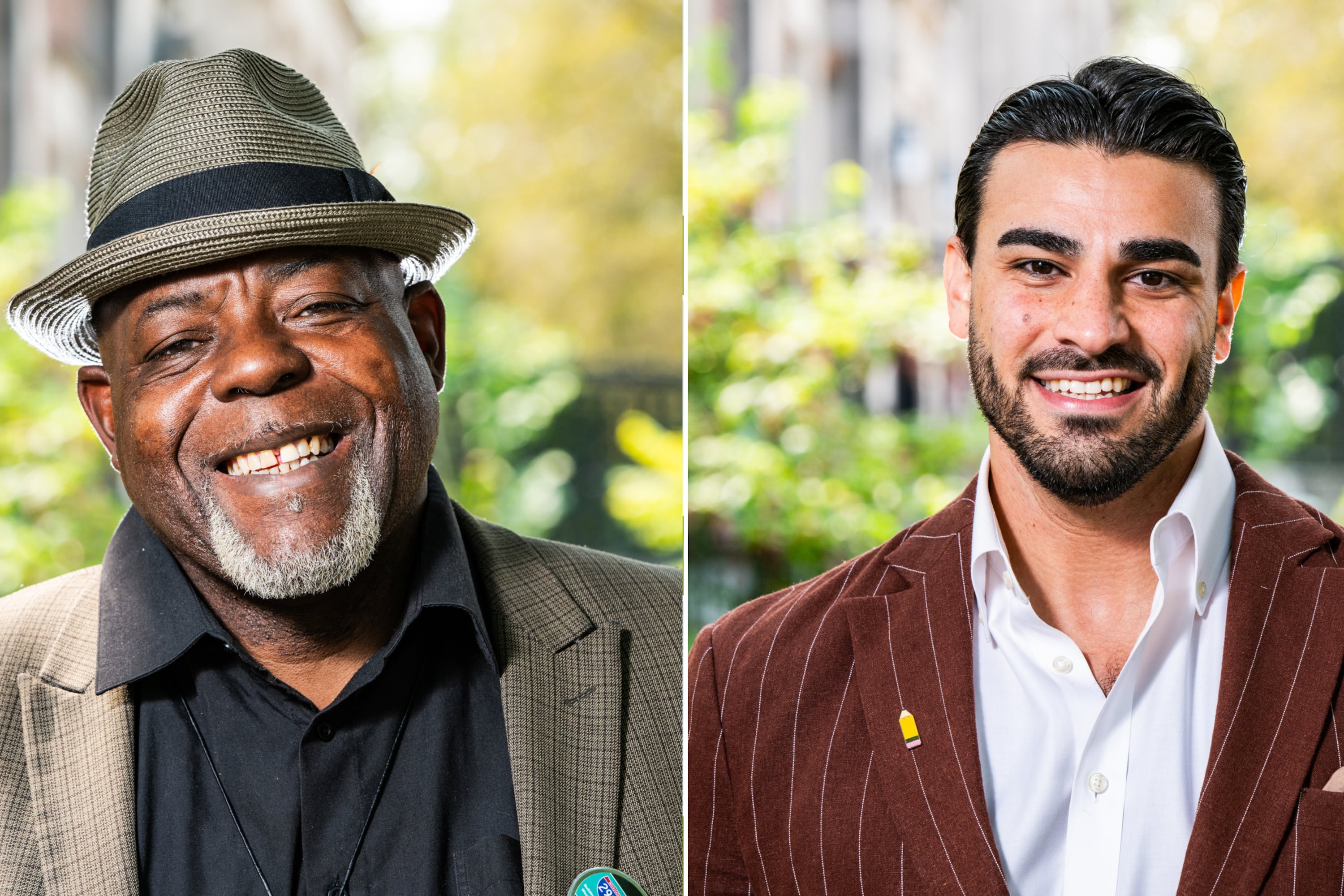Sign up for Chalkbeat Chicago’s free daily newsletter to keep up with the latest education news.

Voters on Chicago’s West Side will see two candidate names on their ballots for the city’s first elected school board race, but just one is actually running for the seat.
And two other people are running as write-in candidates.
Jitu Brown, a longtime Chicago resident and activist with a son in Chicago Public Schools, is the only candidate on the ballot who is running for the seat in District 5, which stretches from the West Loop to Austin.
Votes will not be counted for the other name on the ballot – Michillia Blaise, also a Chicago resident with kids in CPS. She dropped out of the race earlier this month and has not responded to Chalkbeat’s requests for comment on why she dropped out. Max Bever, spokesperson for the Board of Elections said it is too late for the Chicago Board of Elections to remove her name without delaying the printing of ballots by the deadline for early voting.
The two candidates who have filed to run as write-in candidates are Jousef Shkoukani, an attorney who lives in the West Loop, and Kernetha Jones, who owns a home in the Austin neighborhood. Both originally filed paperwork to appear on the ballot but were kicked off, as were several other candidates, as part of the process in which registered voters can file challenges that question the signatures and paperwork candidates must collect in order to run.
The Board of Elections removed Shkoukani’s ballot after it agreed with a challenger who said Shkoukani did not collect enough valid signatures on his petitions, which must include at least 1,000 signatures from registered voters in a candidate’s district. Jones was kicked off after the board agreed with a complaint filed against her, which claimed that she hadn’t filed certain required paperwork on time.
Voters will need to write in either Shkoukani’s or Jones’ name in order to cast votes for them.
The neighborhoods of District 5 have vastly different profiles and needs. The Near West Side, for example, has a median household income of over $106,000, per data from the Chicago Metropolitan Agency for Planning. In the Austin neighborhood, the median income is just over $40,000.
Several neighborhoods are majority Black, low-income areas, where schools have seen declining enrollment and therefore, less funding, and where many district-led school closures occurred under mayors Rahm Emanuel and Richard M. Daley.
The district has a total 105 schools, the most of any school board district. A quarter of those schools are charters, which are publicly funded but privately managed, and must receive periodic approval from the Board of Education to keep operating. Eleven are magnet schools, which draw students from beyond their neighborhoods through a lottery system. Nine are alternative schools, which enroll students at risk of dropping out.
Two of the district’s schools are rated “Exemplary” by the state, meaning they’re in the top 10% for academic performance; 11 have the lowest rating and have been deemed as in need of additional support.
The schools look different from the district as a whole – but not by too much. About 57% of District 5 residents are Black, 19% are white, nearly another 19% are Hispanic, and 3.4% are Asian American.
In District 5’s public schools, as a whole, 62% of students are Black, 5% white, almost 28% Hispanic, and nearly 3% Asian American.
District-run schools in this area tend to be underenrolled, per the district’s standards. CPS has evaluated 66 of the district’s schools for how full they are. Of those, 57 are considered underutilized – meaning they enroll less than 70% of their capacity. Seven are considered “efficient,” and two are overcrowded.
On average, schools in District 5 are 44% full, according to the most recent district data.

Who is Jitu Brown?
Brown, who grew up on the South Side, is a longtime community organizer who has advocated against school closures and a range of other education issues. He was one of a dozen people who went on a hunger strike to push CPS to reopen Dyett High School in Bronzeville.
Brown grew up in the Rosemoor neighborhood and graduated from Kenwood Academy High School. He and his wife bought a home in the Austin neighborhood in 2009 and have lived there since, he said. He has a son who attends Kenwood.
Starting in the 1990s, Brown said he helped run youth leadership programs at schools on the South and West Side and was also a community schools coordinator when the model, which provides wraparound support for kids and families, was first being launched. He volunteered for and eventually oversaw the Kenwood Oakland Community Organization, a progressive advocacy group interested in a range of issues, including education.
Brown is now the national director of the Journey for Justice Alliance, a progressive network of organizations that advocate for improving schools through more “community-driven” approaches, such as the community school model, that reject “privatization.”
Brown, who also advocated for an elected school board, said he decided to run when Mayor Brandon Johnson, whom Brown considers a friend, said he wanted to greatly expand the Sustainable Community Schools model.
At a recent public event during the Democratic National Convention, the mayor said Brown is going to “be elected for the first time ever in the history of Chicago to a school board that is governed by the people.” Brown said he didn’t consider those remarks as an endorsement but hopes to get the mayor’s backing. At the same time, Brown said he’s not interested in “being an insider” or aiming for a higher office.
“I’m not trying to get into another position from doing this,” Brown said. “I don’t know what the future holds, but what I want is to transform Chicago.”
Brown said his top issues include expanding the Sustainable Community Schools model, advocating for more funding from the state and federal governments, and increasing the number of Black teachers at CPS.
Brown advocated against school closures and the expansion of charters under former mayors Emanuel and Daley. He said that he does not support more charter openings in Chicago, but he also said he doesn’t support “uniformly” closing them because that can be “traumatic” for school communities.
Asked how he would represent charters in his district, given that so many in District 5 are charters, he said he would seek to hold them accountable.
“I think that if charter schools are serving neighborhood children, if they are not pushing children out, they’re not using a selective enrollment scheme, they have a friend in me,” Brown said.
Brown has been endorsed by the Chicago Teachers Union, which shares some of Brown’s top priorities.
As of mid-September, Brown had raised $21,500, according to campaign finance reports filed with the state’s Board of Elections. Of that, most came as in-kind support to pay for field staff – including about $8,000 from the Chicago Teachers Union political fund, more than $6,500 from People United for Action, $4,000 from Our Schools Action, and $1,000 from state Sen. Lakesia Collins.
Read Brown’s full questionnaire responses.

Who is Jousef Shkoukani?
Shkoukani, who is running as a write-in candidate, is an attorney who grew up in Michigan. He said he moved to Chicago in 2021 after graduating from law school.
Shkoukani said he and his wife, who is from Chicago, are “building their roots” in the city and plan to have kids, who they would send to the “best available schools,” which right now mean Skinner West, his neighborhood elementary school. However, if asked to choose today, he would be “less inclined” to send his children to the neighborhood high school – Wells – because of its low proficiency rates on reading and math, he said, adding that improving neighborhood schools is one of his goals.
“I think it has all of the potentials of any other school here in Chicago,” Shkoukani said. “I just think that the historic way that we’ve gone about funding it and providing it with resources has not been on the level of the school’s actual need and so because of that, you have those results.”
Shkoukani said he decided to run for school board because, during law school, he became interested in undoing inequality in public schools. He began thinking more deeply about the subject after reading “The Color of Law” by Richard Rothstein, which explores government policies that helped to cement segregation.
In 2020, Shkoukani founded a nonprofit organization called Unified Under Hope, which during the pandemic aimed to provide resources to hospitals. It later morphed into providing tutoring and mentoring to students in “underfunded” school districts in Michigan and still operates today, he said.
If elected, Shkoukani said his other big goals include ensuring all schools are funded equitably. He said the district should be thinking about how to raise alternative sources of revenue and should also ensure that it is spending money wisely, such as by scrutinizing the contractors it hires.
He said he also wants to ensure that students with the highest needs, such as those with disabilities and those learning English as a new language, are receiving the extra support they need.
Read Shkoukani’s full questionnaire responses.
Who is Kernetha Jones?
Jones is running as a write-in candidate.
Jones owns a home in the Austin neighborhood and was raised on the city’s West Side, graduating from Farragut High School, she said. Asked for her current occupation, Jones said she’s a “street minister” and provides advice and prayers to people in her community.
She said she taught as a substitute teacher at CPS district schools, as well as charters, and also taught students with disabilities. She left teaching in the mid-1980s after she and her husband began having their five children, all of whom attended Chicago Public Schools, she said.
Jones told Chalkbeat she didn’t want to run for office at first, but decided to after encouragement from a friend. She also described it as a religious calling, saying God “told me to go and get the children.”
In an interview with Chalkbeat, Jones spoke at length about “parental rights being stripped.” She also often used anti-trans and anti-LGBT language in discussing sex education and gender identities.
Jones claimed schools are “grooming” and “transgendering” students by teaching them “sexually explicit pornography,” but did not immediately share evidence of such claims. She also alleged without proof that schools are showing students how to engage in graphic sex acts.
There is no evidence that the CPS curriculum covers anything Jones cited. The district does offer health and sex education, which is not required by state law. But according to lesson plans posted online, the lessons appear grade appropriate, with students in pre-K through 5 learning about different family structures, gender identity, correct names for body parts, understanding the concept of personal space, and what it means to be inappropriately touched and to report such instances to a trusted adult, and eventually puberty and consent.
In middle and high school, as part of the sex ed curriculum, students are taught about safe sex, sexually transmitted diseases, abstinence, consent, how to identify and report harassment and abuse, what options a student has if they become pregnant, and more about sexual and gender identities.
Schools must provide at least three forms of notification to parents that sex ed instruction will be happening, according to CPS. State law allows parents and guardians to opt their children out of these lessons, CPS says on its website.
Asked how she expects to represent students who are transgender or of different sexual identities, Jones said she’s not against any students or adults who don’t identify as heterosexual, but “I’m against … grooming them in school without the parents’ knowledge. I’m against you changing the children’s names without the parents permission.”
District policy says schools should not share information about a student’s gender identity and expression with others without the student’s consent “or unless authorized by the Law Department.” Students have the right to be addressed by the names and pronouns they wish at school, according to CPS policy.
Another of Jones’ top issues is to hire more Black teachers, particularly at schools with many Black students, so those students can be taught by someone who shares their background. Just over 20% of CPS teachers are Black, while roughly 36% of students are Black.
In other topics, Jones has also criticized the loss of cursive handwriting and reading instruction that does not rely on phonics – an argument that has gained strong traction in recent years and spurred changes to education laws across political party lines.
Jones did not submit a questionnaire.
Reema Amin is a reporter covering Chicago Public Schools. Contact Reema at ramin@chalkbeat.org.
This story was published in partnership with Block Club Chicago.







